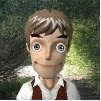Originally I was going to title this "Bitch-slapping Bruce Springsteen", because that's what I felt like doing. But why, you ask ? (And why risk getting the holy crap beat out of me?) I was recently listening to the compilation "The Essential Bruce Springsteen" (Bruce gets 3 CDs in his 'Essential' set, but Dylan gets only 2? Really?) and I had to face my bete noir in the form of the title track from "The River", and all my anger rose to the surface again. But let's go back in time a bit, dear reader...
I wore out my 45 of "Born to Run". I lipsynced the screams, I did my best fake mike work, and you
know I played my air guitar while falling to my knees. And yet...when I heard the "Born to Run" album, it didn't rock enough for me. Was it the piano? The organ? The tight-ass arrangements? I've read that Bruce obsessed with getting just the perfect sound, but it sounded tied down and airless, fake street punk as arranged by Yes. Sure, I still waded through the corny street opera in "Jungleland" to get to the magnificent Wolverine howls at the end (and my late dog Norm howled along) -- but like Ebenezer Scrooge facing the ghost of Jacob Marley ("You might be a bit of underdone potato -- there's more of gravy than grave to you!"), I heard way more Laura Nyro and "West Side Story" in "Born to Run" than I expected. (But then the live box version of "Rosalita" is just as over-arranged, but it's in my Top Ten Live Faves, so go figure.)
Over the years I heard enough Bruce I enjoyed to warrant my own crappy self-selected cassette best-of compilation. Bruce himself suggests that "The Essential" isn't for the fan but the casual listener (though the 3rd CD collects enough rare tracks that the dedicated fan has to bite.) But skimming through "The "Essential", I once again run up against the song that always gets me angry: "The River". Plot: kid hangs out by the river/reservoir, checks out Mary, fine and tan, oops he gets Mary pregnant "and man, that was all she wrote/ And for my 19th birthday/I got a union card and a wedding coat". Now he's stuck in this dead-end town, married and working at the factory until he dies. This is his life from now on. Even the river has dried up! (Enter stage left, pathetic fallacy!)
This song pissed me off no end. Hey, remember the part where Mary's pregnant? -- you have a child, you SELFISH BABY! Yes, you'll have to WORK to support your FAMILY. OH MY GOD, nobody's ever done that and LIVED!! And get this -- you have a union job! You're not slapping burgers at Mickey D's -- you have a decent wage AND HEALTH BENEFITS!!
Deep breath. And there's more. Songs about dreams gone dry, women sitting smoking on the porch in the dark wondering where their life went... I get it, I really do. I understand disappointment, and despair, and feeling trapped. BUT there's more than just YOU in this equation, boyo, and you need to be a man and strap 'em on.
I thought "Is
this how Bruce sees the world? How old
is he?? What a frikkin' baby!" Then finally it dawned on me that Bruce is writing about a character. Oh, and maybe he's pointing out (so subtly that this English major missed it) that
maybe the character is immature. Umm, duh
.
So...I apologize
, Bruce. I didn't understand. I wouldn't dream of attempting to bitch-slap you. Thank you for giving me time to get the picture. I just needed time to let the characters grow up, and, heck, grow up a bit myself.















